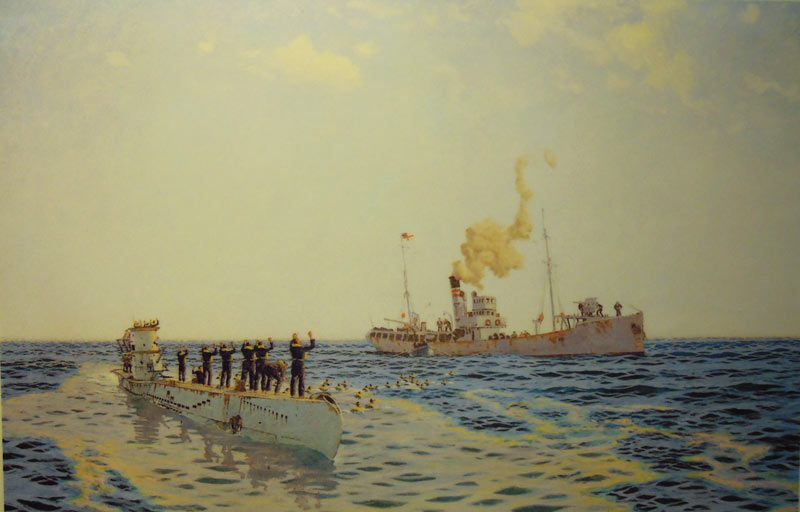
Kurt Schönthier’s Canadian saga began in pitched battle with the British anti-submarine trawler Lady Shirley southwest of Tenerife, Spain. The brief encounter ended with the rescue of Schönthier and 44 of his crewmates.[Charles Pears/National Maritime Museum/Wikimedia]
Kurt Schönthier and his crewmates aboard U-111 were eight days out of the German port at Wilhelmshaven when the order came from their skipper: “Both engines, three-times full-speed ahead!”
They were southwest of Reykjavik, Iceland, and the Type IXB U-boat, on its maiden war patrol, was about to encounter its first prey: the British steamer Somersby.
A veteran of some half-dozen wartime crossings of the North Atlantic, Somersby, with 7,500 tonnes of grain in its hold, had joined a convoy at Halifax, then apparently broke off ahead of schedule bound for Kingston upon Hull, England.
U-111 was on the surface in a rough sea. Their leader, Kapitänleutnant Wilhelm Kleinschmidt, was one of only two men aboard older than 30.
“Within seconds, the diesels answered with their roaring, hammering voice,” Schönthier, the sub’s wireless operator, recalled in a memoir he wrote in 2001.
“The violently crashing breakers against the conning tower, and the strong vibration of the entire boat due to the increased revolutions, transmitted a sense of accelerating speed, putting the whole crew into the spirit of the hunter.”
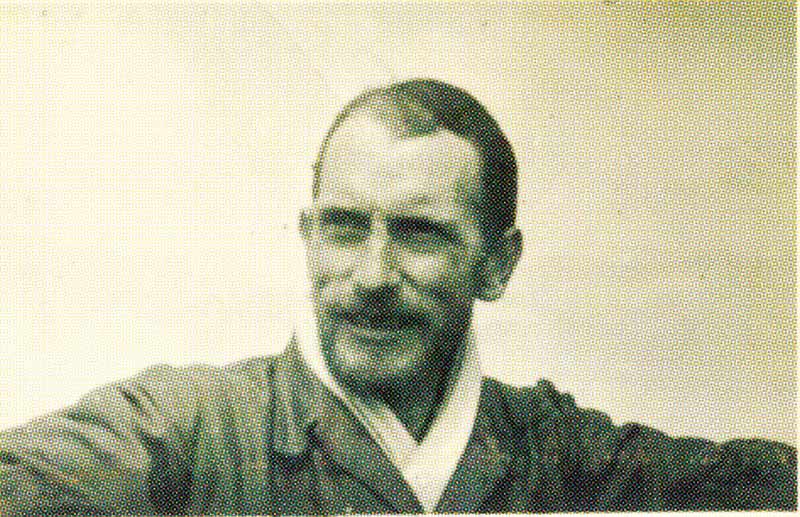
Kapitänleutnant Wilhelm Kleinschmidt [Schönthier family]

Kapitänleutnant Wilhelm Kleinschmidt is congratulated by Kriegsmarine brass as he assumes command of U-111 in December 1940. [Schönthier family]
It was May 13, 1941. The U-boats were peaking, making a critical dent in the supply lines to Britain. But developing Allied technology and tactics would soon begin to close the gap and what would become known as “the First Happy Time” would come to an end.
Shortly before U-111 sailed, word had come down that four subs had been sunk, three of them skippered by the greatest captains in Admiral Karl Dönitz’s fleet of unterseeboots—Otto Kretschmer in U-99, Günther Prien in U-47 and Joachim Schepke in U-100. Kretschmer survived, as did Joachim Matz in the fourth sub, U-70.
“The devil is loose in the Atlantic,” wrote Schönthier. “Gone! All on the same convoy! They (Tommies) must have de-veloped some new detecting devices.
“It gave us the creeps, thinking they outsmarted those old foxes.”
Somersby was making good speed and, Schönthier noted, a ship that can run faster than the average convoy often dared to run alone.
U-111 swung out in an arc, attempting to gain a position ahead of the ship for an attack. Twenty-six torpedoes, each packing some 280 kilograms of explosives, were stored aboard the sub—under the floor plates, on the floor and on the deck
above, as well as inside the four launch tubes in the bow and two in the stern.
Crew had to “crawl on top of the torpedoes to reach our berths…we actually slept, ate, and lived on top of, beside, behind and underneath…those so-called ‘eels.’
“Now is your time, U-111, to prove that you are not a pup anymore; that you have learned the skill to hunt, to chase, to kill,” he wrote. “You know that your strength is your invisibility and your perseverance.
“If you are detected, you are no longer the hunter. You would not only risk losing your prey, but could become the hunted yourself. Thus, keep your distance, young wolf, don’t lose your victim, and run…run…!”
“Only someone completely insane could like a war. Thus, most who are involved would like to end it.”
And run they did. Even at that, it took U-111 half a day to reach their desired position. At 11:41 a.m., Kleinschmidt ordered his forward torpedo room to fire.
Schönthier and crewmate Heinz Kuenne, stopwatch in hand, were in the sound room. Kuenne started the timer. After what Schönthier described as an “eternity” of a few seconds, Kuenne removed his headphones and whispered: “Now.”
“An explosion shuddered our boat, as if he had triggered this with his word. He looked over to me, our eyes met for a few seconds, and without a word spoken, he left the room with a slightly shaking head.” Schönthier sat grim-faced.
The record indicates that Somersby was hit amidships by one of two torpedoes. An hour later, Kleinschmidt fired a coup de grâce. The ship capsized and sank bow-first, its rudder high out of the water. All 43 aboard were picked up by a Greek merchant ship and landed at Loch Ewe, Scotland, their lives spared.
Schönthier grew up on a dairy farm outside the eastern German village of Grün Hartau or, as he wrote, Gruenhartau. It was then a “Nazi fortress” near the Polish and Czechoslovakian borders; it is now the Polish town of Zielenice.
Schönthier’s father was an obersturmführer, a first-lieutenant leading a 180-man platoon in the Nazi party’s paramilitary Sturmabteilung, or SA. Schönthier’s sympathies at the time, later abandoned, were a product of his upbringing and peer pressure.
“To be a member of the Hinterjugend? It was the in-thing for Gruenhartau’s kids,” he wrote. “We didn’t like the Reds or the Sozies (socialists) because our elders didn’t, and we wanted to wear the same uniform as our fathers did.”
Raised on stories of the Kaiser’s navy, Schönthier joined the Kriegsmarine in 1937, a romantic who dreamed of seeing the world, not conquering it. He had no inkling of what lay ahead.
“Only someone completely insane could like a war,” wrote Schönthier. “Thus, most who are involved would like to end it.”
Neither surrender nor a negotiated peace was a realistic expectation in 1941, however. “Thus, we had to win, meaning to kill and destroy as fast and as much as possible to bring this madness to an end.”
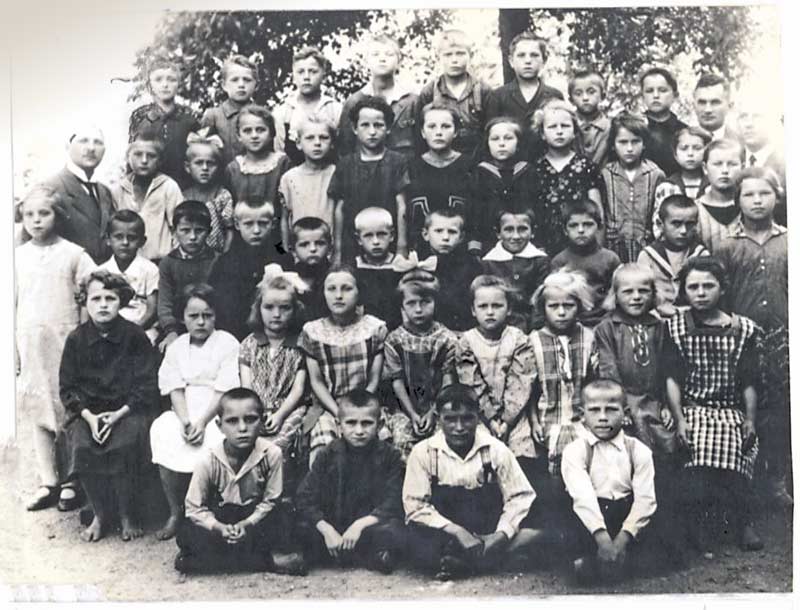
Schönthier is pictured (back left) with classmates (below) at his public school in Gruenhartau in 1929.[Schönthier family]
For the U-boat men of U-111, the task was clear: bring Britain to its knees by denying it its lifeblood.
The gross registered tonnage of ships lost to U-boats would begin a precipitous decline in the spring of 1943—the Allied effort buoyed by the code breakers of Bletchley Park, enhanced sonar technology and long-range aircraft. As tonnages withered, U-boat losses began a relatively steady rise.
“The only thing that ever really frightened me was the U-boat peril,” British Prime Minister Winston Churchill wrote in his postwar memoir. “How much would the U-boat warfare reduce our imports and shipping? Would it ever reach the point where our life would be destroyed?
“Here was…only the slow, cold drawing of lines on charts, which showed potential strangulation.”
In these high times, the U-boat men had panache, an unparalleled esprit de corps. There was a mystique to conducting warfare from within the cloak of invisibility afforded by the ocean depths.
They reveled in their filth, their beards and their successes. They were celebrated heroes back home. But the U-boat life in cramped quarters, over long patrols in hostile waters, was hard and, as the losses mounted, it lost much of its lustre.
Soon, Schönthier would bid farewell to his brother and father for the last time. On Oct. 4, 1941, he and his crewmates would abandon their sinking U-boat southwest of Tenerife, Spain, far from their German homes.
He would spend six years behind barbed wire and, when he finally returned to the fatherland, everything had changed. Canada would become his home.
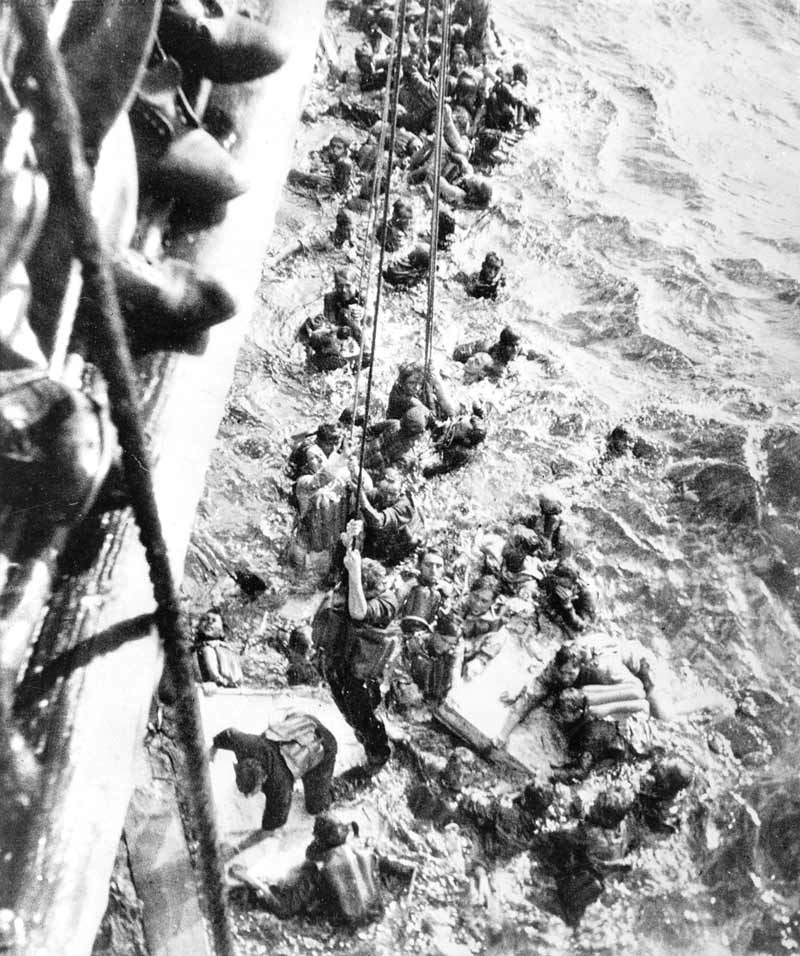
Survivors from the German battleship Bismarck are pulled aboard HMS Dorsetshire on May 27, 1941. About 110 crew survived the battle; some 2,100 died. [IWM/ZZZ3130C/Wikimedia]
“We participated in the vain attempt [to find] any survivors, but only countless life jackets reminded us of the cruel battle.”
A week after its maiden success, with an additional damaged merchant to its credit, U-111 encountered a “giant,” heavily escorted convoy. Kleinschmidt reported it to U-boat headquarters, or BdU, and alerted other U-boats in the area.
He was ordered to stand off, maintain contact with the enemy ships and send dummy signals to enable the approaching battleship Bismarck and the heavy cruiser Prinz Eugen to close.
The plan was for Bismarck and its 38cm guns to lay waste to the convoy. It was a fateful decision, unleashing the mighty battleship. Its breakout from the port at present-day Gdynia, Poland, into open waters would result in a fatal confrontation with the Royal Navy.
Crippled by a torpedo from a carrier-borne Swordfish aircraft and pounded by RN ships, the great vessel was scuttled on May 27, 1941, less than a year after it had been commissioned. HMS Hood was lost in the epic sea battle in which some 2,100 German sailors were killed and about 110 captured; Allied losses numbered 49 killed.
“We participated in the vain attempt [to find] any survivors,” Schönthier wrote, “but only countless life jackets, torn from the bodies by rough sea, reminded us of the cruel battle.”
The Kriegsmarine’s surface operations were never again a significant factor in the Second World War.
U-111 refuelled and replenished at sea, then resumed patrolling North Atlantic waters. The boat’s forward lookouts soon detected a puff of smoke on the horizon. Unawares, a ship was coming directly to them.
U-111 logged another victim—the British steam merchant Barnby, a straggler from Convoy HX-126 out of Halifax with 6,600 tonnes of flour aboard. One crewman, 29-year-old cook John Fletcher of Whitby, England, died of exposure and exhaustion in a lifeboat. The other 36 crew and eight gunners would make landfall at Reykjavik, Iceland.
The U-boat went west to Newfoundland and the Strait of Belle Isle, where it spent more than three foggy weeks conducting weather research, dodging icebergs and slowly exhausting its fuel supply.
With everything running low, they returned to the U-boat base at Lorient, France, making port early on July 7. As the grey streak on the horizon slowly turned to green, and the coloured rooftops appeared “like ornaments,” a light breeze from the east “carried a perfume-like scent over to us, emanating from millions of flowers of Brittany’s meadows.”
It was an unforgettable aroma to olfactory systems that had been under assault by the stench of fuel, grease, mould and body odour for nine long weeks.
After a month ashore, including two weeks with family in Gruenhartau, Schönthier peered out through the train window, looking upon his father, brother Guenther and the village steeple. He would never see them again.
U-111 departed for its second patrol on Aug. 14, 1941. In September, it would sink two ships, the Dutch motor merchant Marken near Brazil on the 10th and the British-owned Cingalese Prince in the middle of the South Atlantic near the equator 10 days later. All 37 crew aboard the former survived; 57 of 77 on the latter died.
In early October, after some close calls, which included an encounter with the British submarine Clyde, U-111 was headed back to port. It was not to be.
A wireless message arrived instructing the German boat to make for waters 220 nautical miles southwest of Tenerife, Spain, where it was to find a disabled 10,000-ton steamer and a sea-going tug. They never did find the steamer, or a tug. Instead, they stumbled upon the British anti-submarine trawler, Lady Shirley. Kleinschmidt was convinced it was the prey they were seeking.
As U-111 encountered its supposedly crippled enemy, Schönthier was stationed at the sound detector in the bow of the boat instead of his usual spot in the radio room at the centre. The reassignment saved his life.
As soon as he made his first sound scan, it became evident that there was something drastically wrong. A ship was closing fast.
“Four splashes, and seconds later the explosions that fatally wounded U-111 threw us around, accompanied by a deafening thunder, amplified a hundredfold by my sound device. My eardrums!”
Schönthier was stunned and deafened. He turned to find an empty boat behind him. He removed his headphones and heard machine-gun fire. Then a muffled explosion.
“Are we shooting? Did we surface?”
He hurried back. The radio room was empty. He heard yelling from the control room. A hand reached up through the bulkhead. He knew the man, a recent addition, Heinz Steffeck. Schönthier took hold of him, but it was of no use.
“I let his lifeless body glide to the floor planks between the radio room and Captain’s bed, and saw that his right side from the shoulder down to his hip was terribly mutilated. The sweetish smell of burnt flesh and gun powder brought me to the brink of vomiting.”
A gun battle was raging topside. Schönthier would have been up there in the middle of it had he been at his usual station and, by now, he would likely have been dead.
All but one on the bridge had already been killed by a direct hit from Lady Shirley’s four-inch gun—seven dead, including the skipper Kleinschmidt and Steffeck, who was delivering ammunition and fell back below when the shell struck.
Another shell hit just behind the boat’s 105mm deck gun, severely wounding two men. The engines were dead; the boat was flooding. The chief engineer, Wulff, issued the order: “Leave the boat, everybody!”
U-111 was sinking and Schönthier was searching frantically for a life jacket.
Grabbing one, he rushed up the ladder to the conning tower. Kleinschmidt’s upper body lay sprawled alongside the periscope. He had been torn in half. Another crewman was sitting upright, “a huge hole clean through his chest.”
Schönthier made his way across four more mutilated bodies and down the ladder to the deck astern. Not 400 metres away was the small ship flying the British naval ensign. Between them, U-111 crew were swimming for their lives. Others were dragging the wounded into the water with them.
As Schönthier swam, a crewmate yelled: “Our Fuehrer! Our Fatherland! U-111! Hurrah!” The others yelled back, “Hurrah!” and Schönthier turned to see their boat, its bow vertical, slowly slide beneath the waves.
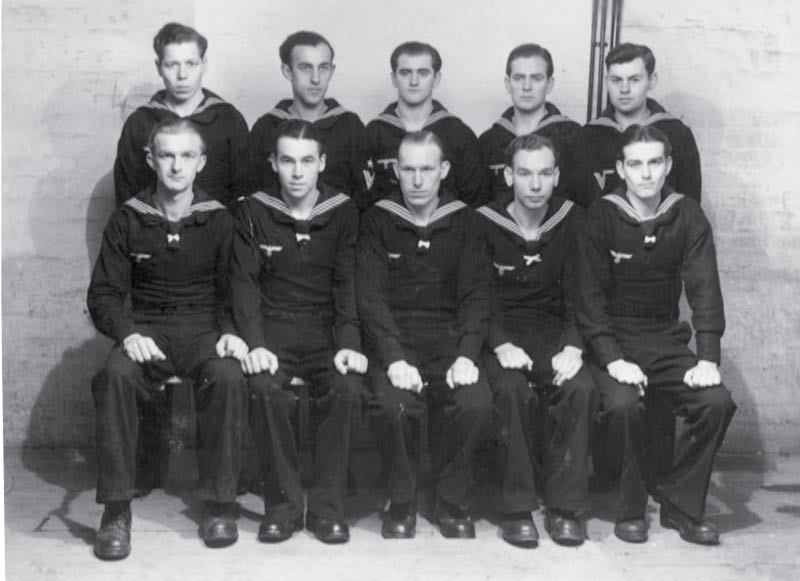
Schönthier (front left) is pictured with naval school classmates. [Schönthier family]

He spent time at PoW Camp 23 in Monteith, Ont. [Schönthier family]
For the next six years, Schönthier’s home was a series of prison camps, first in England, then Canada—the land of “milk and honey, trees and lumberjacks.”
Some 34,000 German prisoners of war would be held in Canada between 1939 and 1945, and beyond. Schönthier first went to Monteith in northern Ontario; then to camps elsewhere in the province, to Alberta and back again. He did a stint at a farm at Fingal in southwestern Ontario, where he lived and worked virtually as a family member, and ended his Canadian captivity where it started, in Monteith.
“Join the Nazis and see Canada!” was a favourite joke among their guards. The PoWs were treated well.
He read, attended classes and studied agriculture; he learned English, performed odd jobs, did kitchen duty and even worked for lumber operations in Ontario and Quebec. And he wrote and read and re-read letters from his fiancée Erna.
News came that his brother Guenther had died in France and, as the war drew to its conclusion, he read the newspaper accounts as Soviet troops overran Gruenhartau. The region, the site of heavy fighting in the closing months of the war, would be ceded to Poland by the time Schönthier left Canada.
The PoWs were shown films from the concentration camps—compulsory viewing.
“I am quite sure that nobody from us POWs knew anything about the happenings inside those Concentration camps,” Schönthier wrote. “We were just as stunned and disgusted about it as anybody in the world.”
Shortly before he was to leave Canada, he got his first letter in more than a year from Erna. “I am waiting for you, Kurt!” she wrote.
As authorities began repatriating the PoWs, appeals went out from farm organizations and lumber companies seeking Germans willing to remain in Canada as free men to work on farms and in lumber camps. Schönthier said half the remaining prisoners expressed interest. He considered the opportunity, but wanted to find his family, see his home and gauge Erna’s feelings first.
“This girl jumped off her bike, and then we held each other and couldn’t say a word…not one word.”
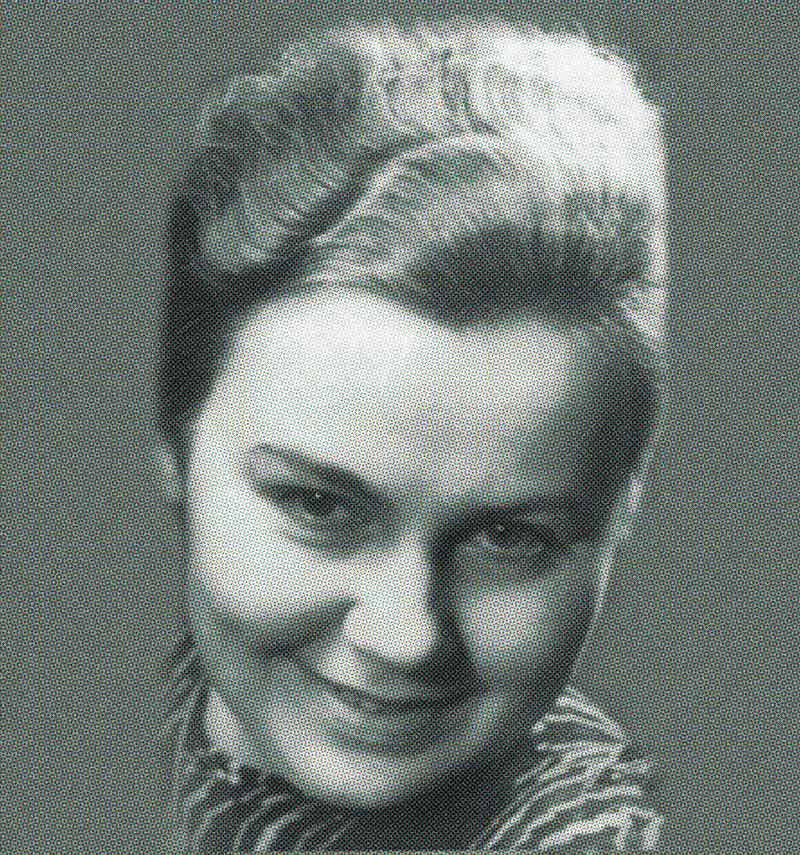
The love of Schönthier’s life was wife Erna. The couple was apart for more than six years during the war, then began a 68-year marriage three months after they reunited in Germany in 1947.[Schönthier family]
Besides those who stayed, many more would return to Canada to live.
When Schönthier finally reached England, he was deemed “not ‘ripe’ politically” to be sent home. He hadn’t seen Erna in six years. He was in a lumber camp when he had ordered their wedding rings from the Eaton’s catalogue and had worn them both since. Erna and his mother were in western Germany. His father was in a Polish prison.
But Schönthier’s convictions bought him another eight months imprisoned in England, where he worked in a kitchen and performed maintenance work at an airbase near London.
Eventually, he abandoned Nazism and politics altogether. “I learned that in most cases, people that are choosing this line for their living are power hungry beings who very seldom keep their great promises.”
He was moved to a transit camp and then, on Aug. 14, 1947—six years to the day since U-111 had left Lorient on its last patrol—headed for the train station, the docks and on to Rotterdam and home.
His mother was in Oldenburg, Germany. He got a ride from the train station aboard a horse-drawn wagon, eventually pulling up in front of the house where she was staying. A woman was standing on the back of a wagon, shovelling peat moss.
“This is my mother!” Schönthier stammered as he leaped to the ground and over the fence. She turned to look and nearly fell. Schönthier took her in his arms.
“You look healthy, my boy,” she said. “This makes me very happy.”
Two hours later, he was waiting at the roadside when there appeared a woman on a bicycle. He hadn’t seen Erna in more than six years but, still, her blond hair was unmistakable.
“I didn’t know I could yell with such a loud voice,” he wrote. “I started to run.
“This girl jumped off her bike and let it run into the ditch, and then we held each other and couldn’t say a word…not one word and, yet, we were saying so much!”
They were married three months later. Schönthier took a farm job and, in October 1949, Erna gave birth to the first of their three children, Rainer. Eight months later, in June 1950, his father died in a Polish prison. He was to have been released in August.
Life in Germany finally brought home to Schönthier the degree to which Germans had been misled and exploited by Hitler and his cronies. They were hard times and Schönthier, for one, had lost his birthplace and the land where he’d been raised. That made it easier to decide to move to Canada.
In January 1951, Schönthier and his family—including his mother—boarded the Canadian Pacific ship Beaverbrae and left for Canada and a new life.
They settled in New Sarum, Ont. Erna waitressed. Schönthier farmed and worked odd jobs before opening an autobody shop. They had two more children.
Later on, the couple took their children on a trip to Germany. Afterward, daughter Kathy turned to them and said: “Mom, Pop, thank you for coming to Canada.”
Wrote Schönthier: “This sentence confirmed that we had followed the right road.”
He died in 2016, age 96. He and Erna were married for 68 years.
Kurt Schönthier’s self-published memoir, The German Immigrant, is available on Amazon.ca.
Advertisement





















